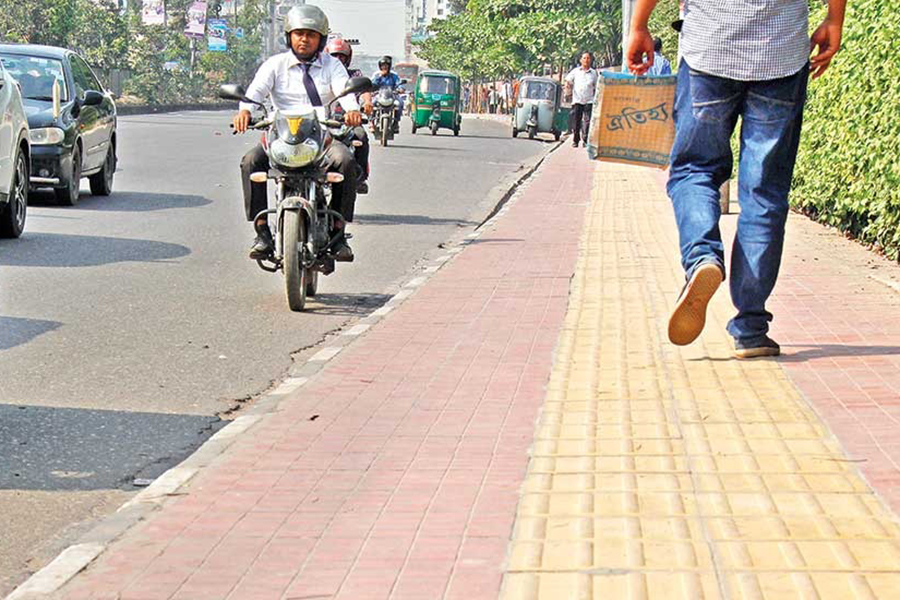

Footpaths are meant to provide safe and accessible spaces for pedestrians, but in Dhaka, they often serve a very different purpose.
Street vendors and hawkers occupy much of the space, selling everything from fruits and snacks to clothes and shoes.
Construction materials are frequently piled up, while motorcyclists and cyclists use the walkways to dodge traffic on the main roads, turning pedestrians’ movement into a daily challenge.
Still, there is some hope for those struggling to walk through these encroachments, as the Dhaka North City Corporation (DNCC) has taken an initiative to make parts of the city walkable again.
The DNCC has decided to deploy 400 armed Ansar members to keep the city’s footpaths permanently free from illegal occupation, UNB reports.
“The main objective of deploying Ansar members on the footpaths is to ensure that no one can reoccupy them after eviction drives. Once the armed Ansar members are stationed, illegal occupiers will not be able to return,” DNCC Administrator Mohammad Ejaz Ahmed told UNB news agency.
He said that from this month, around 50 armed Ansar members will initially be deployed in selected areas, including Uttara, Mirpur, and the Farmgate footbridges and surrounding zones.
By November, the deployment will expand to a total of 400 members within the DNCC’s jurisdiction.
Expenses for the deployment of Ansar members will be covered by the DNCC’s own fund.
Responding to a query, Ejaz Ahmed said, “Over the past seven months, more than 100 magistrate-led eviction drives have been carried out at different points in areas like Uttara, Mirpur, and Farmgate. However, within days, the footpaths are re-occupied by illegal vendors. With armed Ansar on duty, we expect to prevent this recurrence.”
Asked about the impact on small vendors who might lose their livelihoods due to the evictions, he said, “We have planned to introduce selective holiday markets where small traders can legally operate on weekends or designated days. This will help them continue their businesses in an organised way.”
Clearing footpaths of illegal encroachments remains a major challenge, as they serve as a means of livelihood for low-income people and a source of extortion for influential quarters.
During the tenure of the previous Awami League government, local leaders and activists affiliated with the ruling party were widely accused of collecting daily, weekly, and monthly ‘tolls’ from small traders operating along the city’s footpaths.
Street vendors also alleged that a portion of these collections went to members of law enforcement agencies.
After the fall of the Awami League government on August 5 last year, the alleged extortion came to a halt.
The illegal practice, however, allegedly resumed in most parts of Dhaka from the beginning of this year and this time under the banner of a major political party and its affiliated organisations.
During recent visits to several areas including Mirpur, Uttara, Motijheel, Paltan, and Gulistan, it was found that street vendors are once again being forced to pay ‘tolls’.
Talking to UNB, many traders said they had to pay such extortion money to Awami League leaders during the previous regime, but the system briefly stopped after the political changeover last year.
They alleged that leaders and activists of a particular political party and its front organisations are now involved in the same practice.
Several footpath hawkers said they are compelled to make daily payments ranging from Tk 50 to Tk 500 depending on the location and nature of their business.
Those who refuse to pay the demanded ‘tolls’ face harassment or eviction from their trading spots, they alleged.
“No matter who is in power, we have to pay. The faces and political colours may change, but the extortion never stops. It’s a continuous system run by politically connected groups,” said a trader in Mirpur Section-10, preferring not to be named.
Ashis Kumar Dey, president of the National Committee to Protect Shipping, Roads and Railways, said that leaders and activists of political parties, particularly those from the ruling side, have long been involved in footpath extortion.
He alleged that a section of dishonest police officers and city corporation officials are also complicit.
“Awami League and its affiliated organisations carried out such activities for about 15 and a half years. Since the change of power on August 5, 2024, the Awami League has disappeared from the scene. No political party is in power now, yet extortion continues. Unfortunately, the authorities have failed to stop it,” he said.
Urban experts and rights advocates say both the city corporations and the police are well aware of the ongoing extortion but remain largely inactive.
They said freeing footpaths from illegal occupation and curbing organised extortion have become urgent to restore civic order, protect public property, and uphold good governance in the capital.
Commenting on extortion from footpath vendors, DNCC Administrator Ejaz Ahmed said, “Extortionists use the names of political parties to collect money in three ways — first, for setting up shops; second, for providing illegal electricity and water connections; and third, for so-called night security. Once the footpaths are freed and guarded by armed Ansar, this extortion will stop.”
The administrator expressed optimism that the initiative would ensure free movement for pedestrians and bring discipline to the city’s public spaces.


 For all latest news, follow The Financial Express Google News channel.
For all latest news, follow The Financial Express Google News channel.